9 Best Datacenter Proxy Providers of 2024
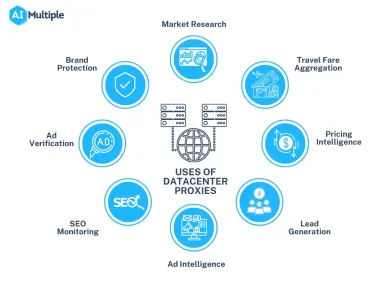
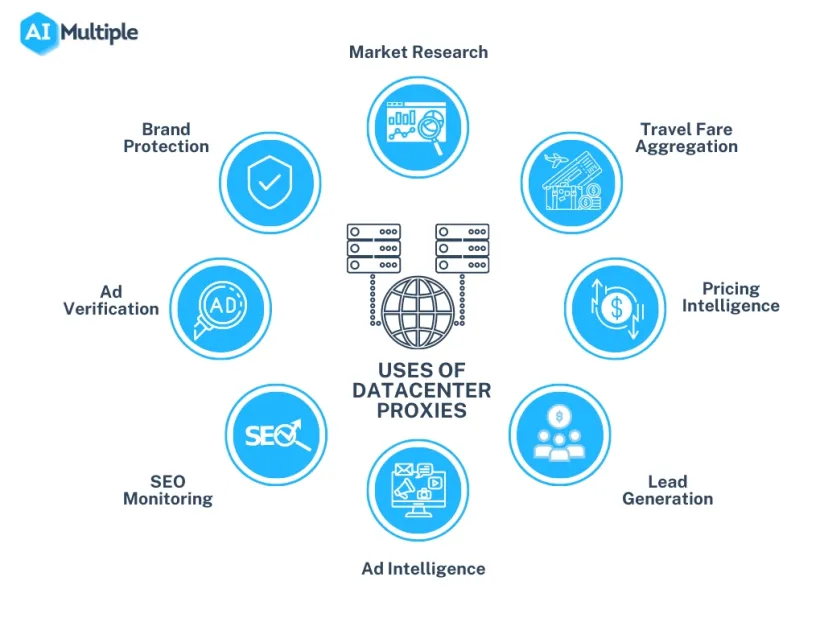
Datacenter proxies are a type of proxy server that are hosted on data center servers. They differ from residential and mobile proxies in terms of their IP source and physical presence. Unlike residential and mobile proxies, datacenter proxies are not associated with an Internet Service Provider (ISP). As datacenter proxies are hosted on remote data center servers, they have faster connection speeds than mobile and residential proxies.
This article explains what datacenter proxies are, how they work, and provide a list of the best datacenter proxy providers along with their features and pricing.
Top datacenter proxy providers of 2024: Quick summary
| Providers | B2B reviews* | B2C reviews** | Starting from/mo | Free trial | PAYG plan |
|---|---|---|---|---|---|
| Bright Data | 4.7 from 180+ reviews | 4.6 from 700+ reviews | $0.06/GB | 7-day | ✅ |
| Smartproxy | 4.4 from 40+ reviews | 4.7 from 1,200+ reviews | $0.7/GB | 14 day money-back | ✅ |
| Oxylabs | 4.7 from 30+ reviews | 4.7 from 400+ reviews | $0.65/GB-shared $1.80/GB-dedicated | 7-day | ✅ |
| Webshare | Limited number of reviews | 4.4 from 500+ reviews | $2.99/100 proxies | 10 free IPs | N/A |
| NetNut | 4.7 from 5+ reviews | 4.5 from ~100 reviews | $1/GB | 7-day | ❌ |
| IPRoyal | 4.6 from 10+ reviews | 4.7 from 1,700+ reviews | $1.39/GB | N/A | ✅ |
| Limeproxies | N/A | 2.0 from 70+ reviews | $3/GB | 3-day trial for $1.99 | ❌ |
| Rayobyte | N/A | 3.9 from 30+ reviews | $2.5/GB | 3-day trial for $1.99 | ❌ |
| Razorproxy | N/A | N/A | $2.8/GB | 100MB free | N/A |
* Ratings and reviews are based on B2B review platforms, including Gartner, G2 and Capterra. Ratings are over 5.
** Ratings and reviews are based on Trustpilot. Ratings are over 5.
Sorting: Vendors who received more B2B reviews are ranked first, with the exception of the products of the article’s sponsors which are linked to sponsor websites.
What are datacenter proxies?
Datacenter proxies, also known as DC proxies, are intermediaries between a user and the internet, forwarding connection requests from the user to the target website and returning the requested data.
Datacenter proxies are hosted on servers in data centers. They replace the user’s original IP address with one temporarily leased from a data center.
The best datacenter proxy services of 2024
1. Bright Data
Bright Data is a proxy service provider that offers various types of proxies with a comprehensive range of features to meet the diverse needs and use cases of its users.
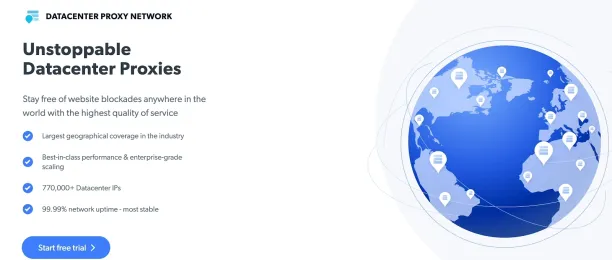
Features:
- Proxy pool: 770,000+ datacenter IPs
- Global coverage: 98 countries
- Proxy manager: Enable users to manage and control multiple proxy servers efficiently. You can monitor proxy usage and detect errors.
- Shared or dedicated IPs: Offers both dedicated (private) and shared datacenter proxies based on users’ specific needs and budget.
- IP rotation: Provides rotating datacenter proxies that switch IP addresses automatically at predefined intervals or after each connection request.
- Extended session control: Enables users to maintain the same IP address throughout the session to appear more natural, reducing the likelihood of being identified as a proxy user.
- City-level targeting: Allows users to select a proxy server associated with the target city.
Price:
- Starting from: $0.066/GB/mo
- Pay-as-you-go: $0.11
- Free trial: 7-days free-trial for companies
2. Smartproxy
Smartproxy offers shared DC proxies worldwide and dedicated datacenter IPs from the US.
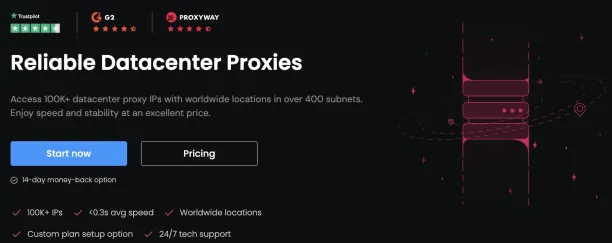
Features:
- Proxy pool: 100K+ datacenter IPs
- Global coverage: 8 countries
- Rotating and sticky sessions: Allows users to change IP addresses at predetermined intervals during connection with a proxy server or maintain the same IP address throughout the session.
- Dashboard for proxy management: Enables users to manage, configure, and monitor their proxies without requiring technical knowledge.
- Dedicated DC proxies: Offers 400K+ static private datacenter IPs in the US with unlimited traffic.
Price:
- Starting from $0.7
- Free trial: Get 35% on your first purchase with Smartproxy
3. Oxylabs
Oxylabs provides a range of proxy solutions, including dedicated and shared datacenter proxies.

Features:
- Proxy pool: 29K IPs (shared datacenter), and 2M+ IPs (dedicated datacenter)
- Global coverage:
- Shared IPs: 15 countries in the US, Europe and Asia
- Dedicated IPs: 188 countries
- Unlimited concurrent sessions: Allows users to make multiple simultaneous connections without any connection restrictions. It is particularly useful for large-scale web scraping and managing multiple accounts.
- City-level targeting: Allows users to specify the city or state from which they want their proxies to originate.
- IPv4 and IPv6 supported with dedicated proxies: Offers IPs compatible with IPv4 (Internet Protocol version 4) and (Internet Protocol version 6). Users can choose and switch between IPv4 and IPv6 based on their specific requirements.
- Automatic proxy rotation: Rotates the user’s IP address either after a certain number of requests or at specified intervals.
- Sticky sessions: Maintains the same IP address for an unlimited period of time.
Price:
- Starting from $0.65 / GB (shared datacenter proxies), $1.80 / IP(dedicated datacenter proxies)
- Free trial: 7 day trial for businesses
4. Webshare
Webshare provides shared and private 200K+ datacenter IPs for individuals and businesses. It is an attractive solution for those seeking affordable datacenter proxy solutions.

Features:
- Proxy pool: N/A
- Global coverage: 52 countries
- Authentication methods: Offers IP or password authentication to secure proxy connections.
- Automated dashboard
- Shared and private proxies
- Automatic proxy rotation
Price:
- Starting from: $2.99/month for 100 IPs
- Free proxies: Webshare has a free plan that includes a limited number of datacenter proxies (10 free IPs).
5. Netnut
NetNut offers 150K shared datacenter IPs. Shared datacenter IPs are used by multiple users simultaneously, making them cheaper than dedicated proxies. The cost of shared datacenter proxies is distributed among multiple users.

Features:
- Proxy pool: 150K shared datacenter IPs
- Global coverage: 30 countries
- Dedicated account manager: Provides personalized service, and help you choose and manage the right proxies.
Price:
- Starting from $1/GB/mo
- Free trial: 7-day trial
6. IPRoyal
IPRoyal offers anonymous and premium datacenter proxies that support HTTPS and SOCKS5 protocols.
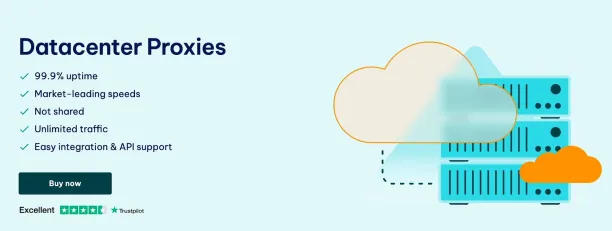
Features:
- Proxy pool: N/A
- Global coverage: 30 countries
- Dedicated datacenter IPs: Offers dedicated datacenter proxy IPs.
- SOCKS5 supported: Offers SOCKS5 support in addition to other proxy protocols such as HTTP and HTTPS.
- Unlimited bandwidth and threads: Allows users to handle multiple simultaneous connections without limitations.
Price:
- Starting from $1.39/proxy
- Free trial: N/A
7. Limeproxies
Limeproxies provides both private and shared datacenter proxies based on users specific requirements, budget, and use case.
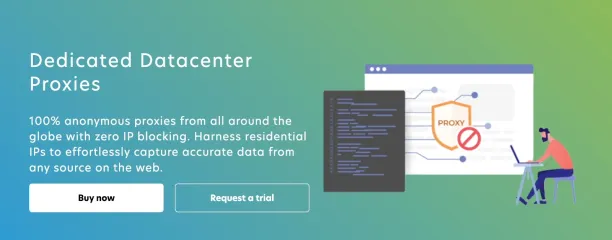
Features:
- Proxy pool: 200k+ shared datacenter proxies and 200k+ dedicated datacenter proxies
- Global coverage: 8+ US locations and 30+ countries around the world
- Automated dashboard: Provides a dashboard to manage and monitor proxy usage.
- City-level targeting
Price:
- Starting from $25/mo for 10 proxies
- Free trial: Available
8. Rayobyte
Rayobyte offers dedicated, semi-dedicated and rotating datacenter proxies for businesses and individuals.

Features:
- Proxy pool: 200k+
- Global coverage: 26 locations
- API Access: Allows users to control IPs, rotate proxies, and track traffic usage. You can add, remove or modify IPs in your data center pool.
- Proxy authentication: Offers IP or user:pass authorization to prevent unauthorized access to the proxy service.
- 30-day replacements: Enables users to refresh the data center pool with a new set of IPs.
Price:
- Starting from $2.5/IP for 5 to 99 proxy IPs
- Free trial: 2 day free trial available.
9. Razorproxy
Razorproxy provides dedicated and shared datacenter IPs from US and EU.
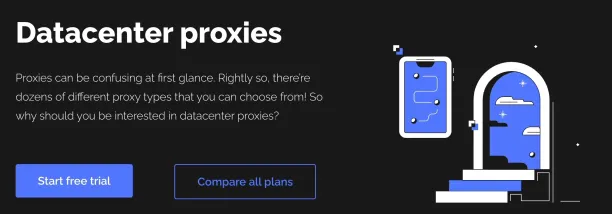
Features:
- Proxy pool: N/A
- Global coverage: Shared datacenter proxies are located in the US and EU (Germany and UK).
- Username/Password authentication: Assigns a unique username and password to the user. The user must provide a valid username and password to connect to the proxy.
- Rotating / Static IPs: Provides users two types of proxy configurations: rotating IPs (also known as dynamic IPs) and static IPs (also known as dedicated or fixed IPs).
Price:
- Starting from $2.8/mo for 100 IPs
- Free trial: Free plan includes 100MB of US-based proxies.
How Do datacenter proxies work?
Datacenter proxies work by acting as a gateway between a user’s device and the target website. Here’s a step-by-step explanation of how datacenter proxies work:
- The user sends a connection request to the proxy server using a web browser or web scraping tool.
- The datacenter proxy receives the connection request from the user’s device.
- This request includes a set of headers, which contain additional information about the client, request, or user agent.
- The datacenter proxy replaces the client’s IP address with its own to prevent the target server from revealing the client’s actual IP address.
- The proxy server forwards the request on behalf of the client to the target server.
- The server receives the request and extracts the client’s IP address from the request headers.
- The web server generates a response based on the client’s request.
- The proxy server receives the provided data from the target server and forwards it to the client.
What are the types of datacenter proxies?
There are three common types of datacenter proxies, each with its own capabilities and use cases.
1. Shared datacenter proxies: Shared datacenter proxies are IP addresses that are used by multiple users simultaneously (Figure 1). The shared datacenter proxy server processes each user’s request and forwards it to the destination website using the same IP address.
Shared datacenter proxies are typically more affordable than dedicated datacenter proxies. However, they pose certain challenges, including slower connection speeds, a higher risk of being blocked, and lower reliability. Shared proxies are suitable for those who require basic anonymity and security while accessing online resources.
Figure 1: This diagram illustrates how a shared proxy works
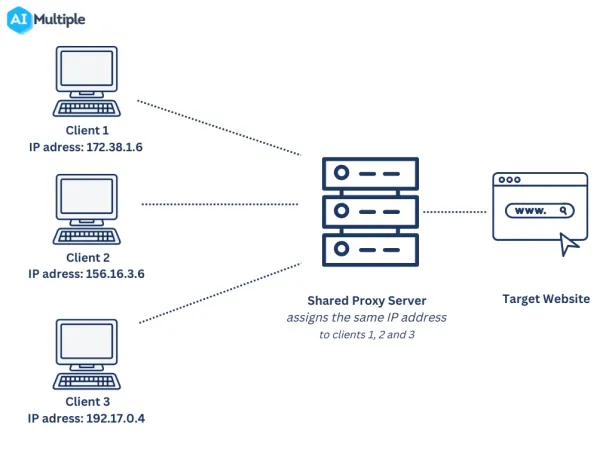
2. Dedicated datacenter proxies: Dedicated datacenter proxies, also referred to as private proxies, are exclusively assigned to a single user. Dedicated proxies provide enhanced performance, faster connection speeds, and increased reliability, since the IP address is not shared with other users.
3. Rotating datacenter proxies: Rotating datacenter proxies automatically change IP addresses at predetermined intervals or after every request made by the user. Rotating proxies can be shared or dedicated IP addresses.
Rotating IPs are particularly useful for tasks that require frequent access to websites, such as large-scale web scraping and load testing.
What is the difference between datacenter and residential proxies?
Residential proxies and datacenter proxies are two types of proxies that act as a gateway between a user and the internet. Datacenter proxies differ from residential proxies, which use IP addresses assigned to residential users by ISPs. Here are the main differences between datacenter and residential proxies:
- Source of IP addresses:
The source of IP addresses is the primary distinction between residential proxies and datacenter proxies. Residential proxies use IP addresses that are assigned by ISPs to residential users, whereas datacenter proxies use IP addresses that are assigned to data centers. - Anonymity and privacy:
Since residential IPs are provided by a real ISP (Internet Service Provider), making them appear more “legitimate” to websites. Datacenter proxies can be easily detected and blacklisted by websites since their IP addresses are associated with data centers. - Speed and performance:
Datacenter IPs are hosted in data centers with high-speed internet connections and higher bandwidth compared to residential internet connections. This makes datacenter proxies faster than residential proxies.
What are the benefits of using datacenter proxies?
Datacenter proxies offer several benefits that make them a popular choice for various use cases, such as search engine scraping, managing social media accounts, brand security, and market research.
1. Faster connection speeds
Datacenter Proxies are known for their speed as they use IP addresses that are sourced from a remote cloud server. However, they may be more easily detected and blocked by websites since their IP addresses are associated with data centers instead of residential networks.
2. Web scraping
Proxies are an important part of any web scraping project. Since web scraping requires a large number of requests to a server from a single IP address, the target website can detect your activities as suspicious and ban the IP address to prevent further scraping.
Rotating datacenter proxies change users’ IP addresses at predetermined intervals or after every request to prevent individual IPs from being flagged for suspicious activity. When choosing a proxy provider for web data extraction, you can consider choosing a larger and more diverse IP pool for a smooth web scraping.
3. Accessing geo-restricted content
Companies gather and analyze market data in order to have a better understanding of their customer’s buying habits, expectations, and current competition. They use proxies to acquire and extract data from web platforms in order to have up-to-date and accurate information about their target market.
One of the most typical roadblocks to tracking competitor data is geo-blocking. When trying to access video content on YouTube, for example, you may have received a message that says “This video is not available in your country.” Geo-blocking is used by online media firms like Amazon Prime and Netflix to comply with the legal systems of different nations. Datacenter proxies enable users to access geo-restricted content and bypass IP barriers.
4. Data from the stock market
Businesses, investors, and trade organizations collect and analyze stock market data in real-time to gain a better understanding of the market’s current state. It provides a thorough grasp of pricing patterns and market trends, as well as assistance in avoiding potential investment hazards. However, it is difficult to obtain accurate real-time data without anti-bot measures such as CAPTCHAs.
Datacenter proxies help individuals ensure certainty and authenticity in their collection of any required information, whether it is external, internal, or a synthesis of numerous sources.
More on proxies
- Top 10 Residential Proxy Providers of 2023
- Top 10 Proxy Service Providers of 2023 for Web Scraping
- The Ultimate Guide to Proxy Server Types
For guidance to choose the right tool, go through data-driven list of proxy services, and reach out to us:

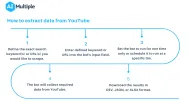
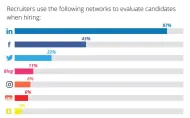
Comments
Your email address will not be published. All fields are required.